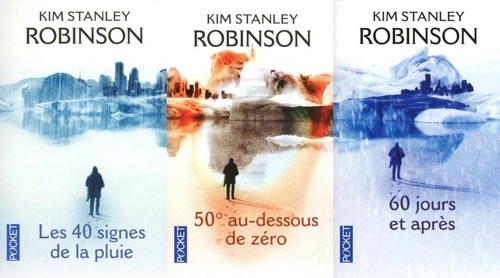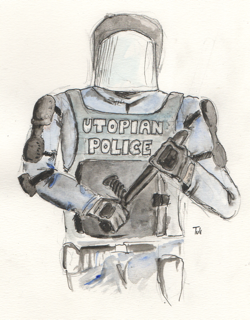Odds & Ends of July, continued
Submitted by KimonMore news for July! Most are somewhat stale news, as real life is taking its toll.
The Best Of Kim Stanley Robinson (Night Shade Books, 2010) has been out for a while now, and is available as hardback, paperback or e-book.
It's been getting some reviews, notably this one by Strange Horizons contributor Niall Harrison.
Few other writers can capture so vividly the sense of being-in-the-world.
[On "Remaking History" and "A Sensitive Dependence on Initial Conditions"] In Galileo's Dream, when the maestro is whisked away to the year 3,000 and given a history lesson, this is pretty much what he's shown: a great river of histories, many streams braided together to carve a limited channel through possibility space. Whether or not this is a sustainable model for understanding history, it strikes me that it's a fascinating way of understanding science fiction's versions of history—indeed, as John Clute argued in setting out the concept of "First SF", the existence of an early default narrative for the genre, it was the compelling understanding of the field as late as the early 1990s. Since then, we are meant to understand that there is no consensus history of the future in the way that the Moon-Mars-Stars progression provided a backdrop for the Golden Age. And yet the version of our future that Galileo is shown passes through a wrecked world, a rebuilding with an increased understanding of environmental stewardship, a slow exploration of the solar system. It's impressive, when you stop to look at it, how much contemporary SF falls somewhere on this timeline—Paolo Bacigalupi's The Windup Girl (2009) at its nearest end, Paul McAuley's The Quiet War (2008) at the other, Ken MacLeod's Fall Revolution quartet (1995-1999) covering the whole spread. As a template narrative, its only real contemporary competition is the Singularity.
By the way, Strange Horizons previously had a fun little debate starting from a quote from an interview with Robinson. The subject was infodumps in science fiction novels... well, actually, infodumps in Robinson's novels!
Strange Horizons (Paul Kincaid) also reviewed 80! Memories and Reflections on Ursula K. Le Guin, on which Robinson contributed.
The cover art for The Best Of was actually not made for the book specifically. Its title is actually "Goodnight Tale" and it was made in 2009 by Joe Jesus. It is available on his deviantART site for download in high quality!

The short story "The Lunatics", recently reprinted in the collection "Brave New Worlds" (Night Shade Books, 2011), is available online for free from Tor.com, as part of their "Dystopia Week".
Good news for our French friends: the translated Science in the Capital trilogy now has new paperback editions! French is the language Robinson has been the most translated into (as far as I know).
Bonnes nouvelles pour nos amis français: Les livres 40 / 50 / 60, ou la trilogie de la Science dans la Capitale, sont désormais édités en livres de poche par Pocket, bien plus commodes (et économiques!) que ces larges volumes de la première édition!

Alyssa Rosenberg from ThinkProgress has been writing for and animating a Book Club discussion on Red Mars since last month, and there has been some good discussion in there. There have been 5 parts so far, with the upcoming sixth that will wrap the book up:
- 'Red Mars' Book Club Part I: Escape Velocity: RM Parts I-II
- 'Red Mars' Book Club Part II: Hearts and Heads: RM Part III
- 'Red Mars' Book Club Part III: Evolution and Engineering: RM Parts IV-V
- 'Red Mars' Book Club Part IV: The Art of the Possible: RM Part VI
- 'Red Mars' Book Club Part V: Destroyer of Worlds: RM Part VII
- [Edit Jul-16-2011: 'Red Mars' Book Club Part VI: Water and the Rock: RM Part VIII]

Thanks to Google alerts, it's sometimes fun to track down all mentions of Kim Stanley Robinson in articles that are published on the internet. For example:
- MIT's Technology Review has published a list of "The Best Hard Science Fiction Books of all Time", or rather "Ten titles that inspired Technology Review to publish its own collection of sci-fi stories". Between Jules Verne and Vernor Vinge can be found Kim Stanley Robinson's Mars trilogy:
This tale of the colonization of Mars begins in 2026 and ends two hundred years later, with the terraforming of Mars largely completed and humanity making its first steps into interstellar space. Packed with detailed descriptions of the colonist's everyday lives, and a close attention to the geography of Mars, it's as close as any of us will get to walking on the red planet. (If, sometime after reading this, you become an actual explorer of Mars, feel free to look me up and berate me for my lack of faith in you. It'll be something to tell the other people at the old folks home.)
- This article from the University of Exeter discusses "The novel in a time of climate change": "Researchers at the University of Exeter are leading the way in the literary analysis of climate change as a cultural phenomenon", with academic publications accompanying that. Who knew the European Commission's European Social Fund would fund projects like 'From Climate to Landscape: Imagining the Future'? Robinson's Science in the Capital trilogy is discussed.
- This blogger (Yet Another Anarchist Blog) has posted "A Few Thoughts on Antiauthoritarian Utopianisms" and quickly moves from Plato's Republic to Le Guin's Dispossessed and Robinson's Mars trilogy. Artwork on the right from there.
Rest assured, there is more coming!
